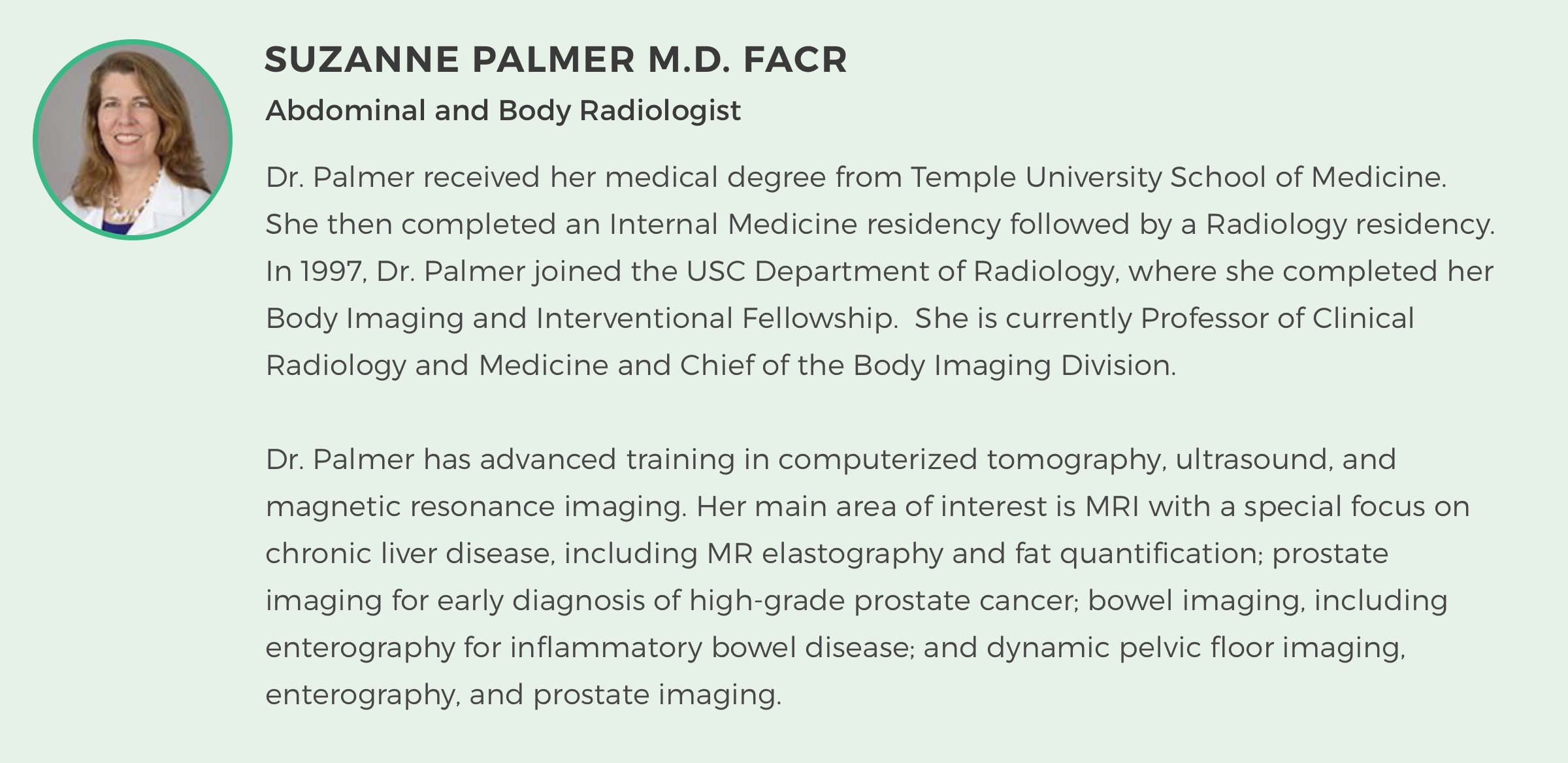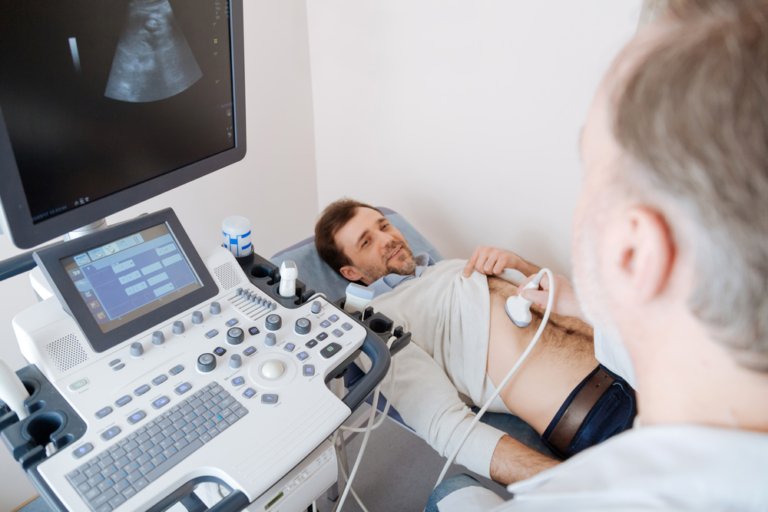Over the last three decades, liver cancer incidence and death rates have been increasing rapidly. But with routine liver cancer screening, the American Cancer Society estimates that over 70% of liver cancers could be prevented.
Unlike most other cancers for which the causes are unknown, the majority of liver cancer cases can be linked to a handful of identifiable risk factors and preexisting conditions, like obesity, hepatitis infections, and underlying liver diseases. However, because liver cancer is typically asymptomatic until its later stages, it is rarely discovered early. Getting a liver scan allows doctors to keep an eye on precancerous situations in at-risk individuals and can help ensure any tumors that do grow are detected right away, when they’re easiest to treat.
From what puts you at risk of liver damage to expert advice on how to get the most out of your liver scan, we spoke with world-renowned body imager Dr. Suzanne Palmer and hepatology expert Dr. John Donovan to find out what every adult should know about liver cancer screening.
DocPanel is committed to making sure every patient receives excellent care. If you would like an expert second opinion on your medical imaging scan from Dr. Palmer or one of our other abdominal subspecialists, you can learn more here.
Is liver cancer screening right for you?
[DocPanel] While most adults have heard of liver cancer screening, many are unfamiliar with the criteria that make a routine liver scan necessary. How can an individual know if they should be getting screened?
[Dr. Palmer]
The need for a liver scan depends on the level of suspicion your primary care physician has of you having a liver disorder. The concern of a liver condition may be brought to attention by nonspecific symptoms, physical examination findings, or the results of routine laboratory testing.
But, there are also other risk factors that don’t necessarily set off any alarms, yet still suggest the need for liver cancer screening. A history of alcohol abuse, remote blood transfusion before 1992, intravenous or nasal drug use, being a “baby boomer”, obesity, autoimmune disease, and family histories of genetic liver disorders are all silent risk factors. If you are diagnosed with cirrhosis, fatty liver disease, or hepatitis B or C, you are also at increased risk of developing liver cancer.
Individuals should consult with their primary care provider to discuss whether they are at risk for various liver diseases. Liver cancer screening for individuals at risk is most often accomplished by a liver ultrasound examination performed every 6 months.
Understanding liver damage
[DocPanel] What differentiates liver disease from liver cancer?
[Dr. Palmer]
A liver disease refers to an abnormal condition within the liver’s tissue that causes damage and prevents it from functioning well. Liver diseases can be silent or they may cause varying degrees of illness. Excessive alcohol use, certain viruses, obesity, autoimmune disorders, and rare inherited conditions can all cause liver disease.
Most, if not all, liver diseases and conditions have the potential to cause cirrhosis – an advanced stage of liver scarring (fibrosis) that results from repeated damage to the liver. 70 to 90 percent of all liver cancer cases in the US occur in livers that are cirrhotic, making it the biggest risk factor for liver cancer.
Liver cancer begins in the cells of the liver and, like most cancers, can invade normal tissue and move (metastasis) to other organs. Usually, the development of liver cancer is silent and not associated with symptoms. This is why it is so important that people with cirrhosis and other at-risk individuals have routine liver cancer screening examinations performed at regular intervals. While cirrhosis can’t be undone, further damage can be limited – which can at least help prevent the risk of developing liver cancer from increasing.
[DocPanel] What symptoms or signs are indicative of liver damage?
[Dr. Palmer]
Typically speaking, most people do not develop symptoms of liver damage until the later stages. This can make catching it early quite difficult.
In the case that any risks for diseases are discovered in a patient, laboratory tests and imaging studies can be ordered regularly by their primary care provider. Regular liver cancer screening of this sort can help doctors detect liver disorders early – when they are most responsive to treatment.
Indications of advanced liver diseases may include yellowing of the skin (jaundice), abdominal bloating and distension (ascites), and internal bleeding (varices) that causes the vomiting of blood or the passage of black or blood-containing stool.
CONNECT WITH A SPECIALIST
Take Charge of Your Health
Get a second opinion from a radiology specialist in 3 easy steps.
What to know about your liver scan
[DocPanel] What type of liver scan should a patient get if they fall into the at-risk category?
[Dr. Palmer]
Typically, a liver ultrasound would be the first step in image evaluation for the liver. More advanced imaging, such as a CT liver scan or an MRI, may be necessary as a follow-up to better define any abnormalities that are discovered on the liver ultrasound.
People with cirrhosis should undergo routine liver cancer screening every 6 months to check for developing tumors. A liver ultrasound examination is typically sufficient for each checkup, assuming no abnormalities were discovered.
While prevention is, of course, the overall goal to reduce liver cancer deaths, early detection drastically improves survival rates. Accurately diagnosing liver cancer, however, can be difficult. Many types of liver lesions share characteristics, benign tumors can mimic malignant tumors, and liver masses can be easily missed altogether on a liver scan.
To prevent diagnostic errors, it is highly recommended that patients get a second opinion on their liver cancer screening tests from a subspecialty radiologist. Without proper experience, there is an increased risk of a misdiagnosis. Having a specialist provide a second opinion helps eliminate that risk.
Specialty interpretation of a liver scan is especially important for patients who are navigating a liver cancer diagnosis. Treatment varies greatly depending on the stage and type of liver cancer – having another set of eyes confirm a diagnosis is extremely valuable, even if it’s just for peace of mind.
[DocPanel] Can cirrhosis be reversed?
[Dr. Palmer]
Liver damage from cirrhosis can rarely be reversed; but, in many cases – especially when caught early – a liver’s health can improve and further damage can be prevented or limited. This requires the removal of the conditions causing disease. For instance – alcohol abstinence in patients with alcohol-related liver diseases, weight loss, and control of metabolic factors in patients with fatty liver diseases, treatment of hepatitis B or C in patients with viral liver diseases, and immune suppression therapies in patients with autoimmune liver diseases.
[DocPanel] What are the three pieces of advice you have for patients in regard to their liver health?
[Dr. Palmer]
My three recommendations are:
- Avoid excessive alcohol, and diet and exercise if overweight
- Ask your primary care physician if you are at risk for liver disease
- Get a second opinion on your liver scan to ensure accuracy
Liver cancer is one of the few cancers whose rates are rising instead of falling. Fortunately, liver cancer screening has the potential to change that.
The obesity epidemic, a primary culprit, is causing many individuals to develop cirrhosis – the leading risk factor for liver cancer. Living a healthy lifestyle can help prevent the development and progression of liver damage. For risk factors outside of one’s control, maintaining a clear line of communication with your primary care physician will help ensure you stay up to date on whether or not liver cancer screening is for you. And for those who have been diagnosed with liver damage or liver cancer, getting a second opinion on your liver scans will help ensure an accurate diagnosis and correct management plan.

